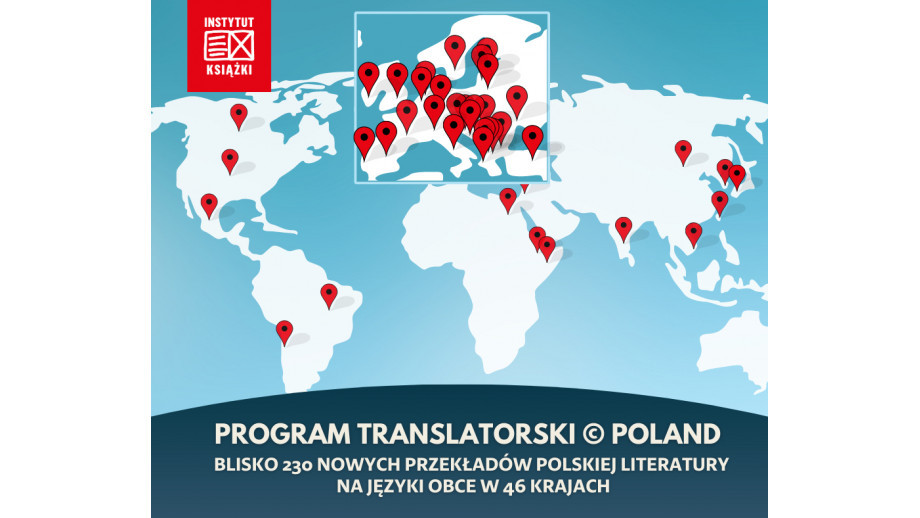News

Almost 5 million zlotys for translations of Polish literature into foreign languages
The Book Institute has concluded this year's call for applications for the ©POLAND Translation Programme, which aims to support the translation of works of Polish literature into other languages. In 2023, we have allocated nearly PLN 5 000 000 from the budget of the Ministry of Culture and National Heritage.
This time, a total of 229 editions of Polish books were supported, which will be published by publishers from 46 countries. The total amount of grants awarded was €1,003,559. Of this amount, €421,081 went to translations of books for children and young people and comics, and €582,478 to translations of literature aimed at an adult audience.
In this edition of the ©POLAND Translation Programme, publishers from Spain received the most grants - we funded a total of 24 translation projects into Spanish and seven into Catalan. In turn, the largest total amounts of support were received by translations into German, English, and Spanish. To support the translation of Polish books into each of these three languages, we have allocated sums of more than EUR 100,000.
It is noteworthy that the interest of foreign publishers in this year's programme was much greater than in previous calls. Between 1 February and 31 March this year, we received as many as 329 applications for a total of €3 221 914. Projects that could not receive support will have a chance to do so in future editions.
English, Spanish, Chinese... and more
Our priority this year was to support translations into English, Spanish, and Chinese. We treat the English language in a special way for an obvious reason - it is very often the case that readers and publishers from other countries become acquainted with works of Polish literature precisely through translations into the language of Shakespeare.
The priority given to publishers from Spanish- and Chinese-speaking countries, on the other hand, is related to the promotional activities we are currently carrying out in countries from these language areas. In 2022, the Book Institute has established a very clear presence at the LIBER International Book Fair in Spain, and this October, Poland will have the honour of being the Guest of Honour at the event. Our interest in the Chinese-speaking market was also highlighted by an important initiative: at the end of January and the beginning of February, we organised a well-received Polish stand at the Taipei International Book Exhibition, where Poland also acted as Guest of Honour. It is worth mentioning that the Taiwanese fair is one of the largest industry events in Asia.
One look at the results of this year's call for applications for the ©POLAND Translation Programme is proof that our activities are having a tangible impact. In 2019-2021, we received just two grant applications for translations into traditional Chinese, while in 2022 and 2023, there are a total of thirteen. Although the number of requests from the Spanish-speaking area remains steady at around 20-30 requests per year, this year, we received offers from publishers from countries such as Mexico and Chile.
In addition to publishers from the English, Spanish and Chinese-speaking markets, publishers from neighbouring countries such as the Ukraine, the Czech Republic, Germany, and Lithuania can, as always, count on support. This does not mean, however, that others have been overlooked: this year, we have supported translations into as many as 39 languages, including some into which Polish literature is rarely translated, such as Tamil (Guguły [“Swallowing Mercury”] by Wioletta Grzegorzewska) and Amharic (Dom z witrażem [“The House with the Stained-Glass Window”] by Żanna Słoniowska).
First of all, the classics
This year, applications for funding of foreign-language editions of works belonging to the classics of Polish literature were also the subject of particular support. This was possible thanks to the Ministry of Culture and National Heritage, which increased the programme's budget by as much as PLN 1 000 000 for this purpose.
The 'Modern Classics' priority aims to meet the specific needs of publishers of older literature, which is often of high artistic and cultural value, but which is less likely to be commercially successful. This year, among the classic works of Polish literature that received funding were the following titles: Lalka ("The Doll") by Bolesław Prus (German translation), Dziennik bez samogłosek ("Diary without Vowels") by Aleksander Wat (English translation), Inny świat ("A World Apart") by Gustaw Herling-Grudzinski (Bosnian translation), Na nieludzkiej ziemi (“Inhuman Land”) by Józef Czapski (Italian translation), and Wiersze wybrane (“Selected Poems”) by Zbigniew Herbert, Zuzanna Ginczanka, and Witold Wirpsza (all English translations).
Importantly, continuing to bring the great works of Polish writers to foreign audiences will remain one of our priorities in future editions of the programme. The Ministry of Culture and National Heritage has indeed announced that an increased budget for translations of classics of Polish literature is also planned for the coming years.
Hundreds of translations every year
The ©Poland Translation Programme is a flagship programme of the Book Institute. Its main objective is to promote Polish literature around the world by providing financial support for the publication of works of Polish literature in translation into foreign languages. The grant obtained can be used to finance part of the cost of publishing the work, including, among other things, the translation of the work from Polish into another language, the purchase of copyright licences, and the printing of the book.
Each year, our competition is open to all publishers who intend to publish a translation of a Polish book outside Poland. The programme covers fiction, children's literature and comics, as well as non-fiction, historical works, and books on ancient and contemporary humanities.
Thanks to the ©Poland Translation Programme, hundreds of Polish books are published abroad each year.
The list of projects supported in this year's edition can be found here.